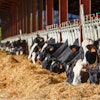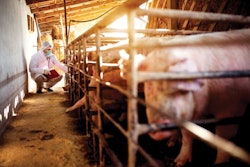
Already, the number of confirmed outbreaks of African swine fever (ASF) in European wild boar is approaching 1,000 for the year so far.
This is based on information published by the European Commission (EC) through its Animal Disease Information System. It monitors notifiable animal diseases in European Union (EU) member states, and most adjacent countries.
Not only is the latest total an increase of 146 compared with the edition seven days previously, one country has confirmed its first cases of 2024. With the recent addition of Moldova, outbreaks in wild boar have occurred in 19 countries covered by the EC’s System since the start of the year. During the whole of 2023, 20 nations registered a total of just over 7,900 outbreaks in this population.
However, two positive developments on the progress of ASF in European wild boar are worthy of note.
The Czech Republic (Czechia) has confirmed just one ASF case in a wild boar over the past two months. In Sweden, there have been no outbreaks for almost three months, despite extensive testing of the wild boar population. While the original source of the virus has not been identified, all the infected carcasses have been found within a small area.
Furthermore, just a handful of new outbreaks in domestic pigs have been recorded over the past week.
14 European states record ASF in wild boar
As of February 9, the total number of ASF outbreaks in wild boar reported to the EC’s System had reached 983.
According to the system, Poland has registered the most outbreaks in this category with a total so far in 2024 of 224. It is followed by Bulgaria (186), Italy (160), Latvia (89), Lithuania (83) and Hungary (78). With the exception of Italy, all of these figures were higher than in the previous edition dated February 2.
Also registering further cases were Bosnia-Herzegovina, Croatia, Germany, Greece, Romania, Slovakia and Ukraine.
Almost without exception, the veterinary authorities of these countries have also notified the World Organisation for Animal Health (WOAH) about ASF developments in their respective countries over the past week.
Furthermore, the Italian agency has confirmed a further 85 outbreaks in wild boar over the past seven days. These were located in several provinces, all in the northwest of the country.
According to regional veterinary authority IZSAM, there have been 1,605 cases of ASF in the nation’s wild boar since January 2022 (as of February 15).
So far, the highest losses have occurred in Alessandria (Piedmont region) and Genova (Liguria). New cases have been identified in those provinces over the previous week, as well as in Piacenza (Emilia-Romagna), and Pavia (Lombardy).
New cases in swine in 3 countries
Over the past week, new ASF infections in domestic pigs have been confirmed in Bosnia-Herzegovina, Greece, and Romania, based on information provided to both the EC and WOAH.
To WOAH, the veterinary agency of Bosnia-Herzegovina has reported cases in four backyard herds in two districts of the Republic of Srpska. Directly impacted were a total of 35 swine.
Since the virus was first detected in this Balkan state in June 2023, 1,515 outbreaks in domestic animals have been confirmed with WOAH. Directly impacted have been around 60,300 pigs in all three regions of the country.
In Greece, one further outbreak brings the national total in domestic animals since January of 2023 to eight. Affecting a farm with approximately 490 pigs, the latest outbreak was in the Central Macedonia region in the north of the country.
Romania’s only outbreak recently reported to WOAH involved a small backyard herd in a western county.
View our continuing coverage of the global African swine fever situation.

















